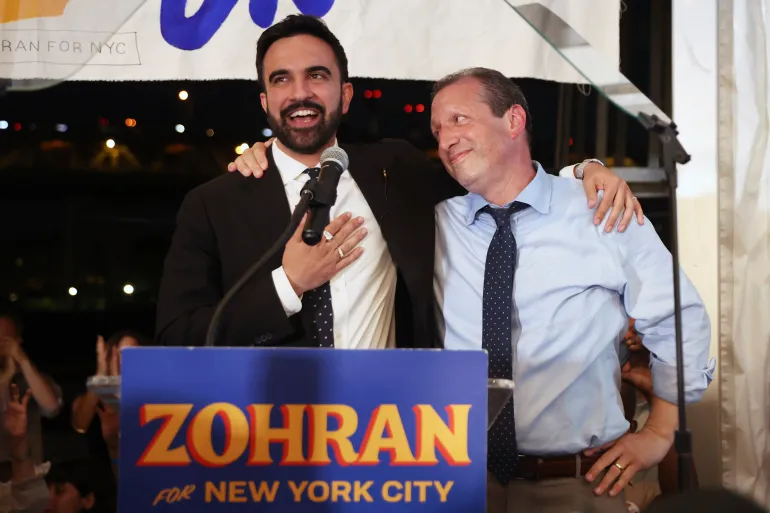On June 24, 2025, Queens Assemblyman Zohran Mamdani made history by winning the New York City Democratic mayoral primary, a victory that has sent ripples through the city’s political landscape. At just 33 years old, Mamdani, a Democratic socialist and the first South Asian man elected to the New York State Assembly, emerged as a frontrunner, defeating former Governor Andrew Cuomo in a stunning upset. His campaign, fueled by a grassroots army of community organizers and a bold vision for affordability, has sparked both optimism and debate about the future of the city.
A Campaign Rooted in Community
Mamdani’s victory was powered by an unprecedented mobilization of community organizers, particularly in Queens neighborhoods like Richmond Hill and Ozone Park, where he secured 51% and 64% of the vote, respectively, according to the city’s Board of Elections. Over 993,000 New Yorkers turned out for the primary, surpassing the 942,000 voters from four years prior. This surge in participation, especially among younger voters and the Asian American community, was a testament to the strength of Mamdani’s people-powered campaign.
At Phil “Scooter” Rizzuto Park in Queens, hundreds of volunteers, including members of the New York City Democratic Socialists of America, set up camp for four days, distributing materials and knocking on doors. “Hundreds of us were stationed at poll sites across south Queens,” said Mohamed Q. Amin, a longtime organizer in Richmond Hill. “There’s a lot of joy and representation in the possibility of the first Muslim immigrant South Asian mayor.”
Aaron Fernando, a CUNY Law student and staging captain, echoed this sentiment: “I believed Zohran Mamdani’s message on affordability. I’m a rent-stabilized tenant, and I’ve seen the problems of rising rents and slow buses.” For many, Mamdani’s focus on issues like freezing rent prices, eliminating bus fares, and expanding mental health outreach resonated deeply, reflecting the struggles of everyday New Yorkers.
A Vision for a More Affordable City
Mamdani’s platform centered on making New York City more affordable and equitable. His proposals included taxing the wealthy, providing free child care, offering free bus rides, and building more affordable housing. These ideas struck a chord with voters frustrated by the rising cost of living. “Seeing a different kind of politician really resonated with me,” said voter Ahmed Sleiman. “His slogan of making it affordable for New Yorkers hit home.”
Mamdani’s ability to connect with diverse communities was key. His campaign videos, often infused with nods to his Indian heritage and multilingual appeals in Spanish, Bangla, and other languages, went viral on platforms like TikTok. From participating in the Coney Island polar plunge to walking the length of Manhattan, Mamdani’s creative outreach helped him reach voters beyond his Queens base.
State Senator John Liu praised the role of the Asian American community in Mamdani’s victory: “Asian communities in Queens, Brooklyn, and Manhattan turned out in droves to support Zohran’s refreshing vision. He created a movement that vocalized the concerns of everyday New Yorkers.”
A New Kind of Leader
Born in Kampala, Uganda, to Indian parents, Mamdani moved to New York City at age seven. His mother, award-winning filmmaker Mira Nair, and his father, Columbia University professor Mahmood Mamdani, raised him in a household steeped in art and academia. A graduate of Bowdoin College, Mamdani worked as a foreclosure prevention counselor in Queens before entering politics, an experience that shaped his commitment to affordability.
Once a fledgling rapper known as Young Cardamom, Mamdani brought a unique energy to his campaign. His 2019 song “Nani,” dedicated to his grandmother, even found new life as his campaign gained momentum. Elected to the State Assembly in 2020, he made waves with a pilot program for free city buses and has been a vocal advocate for progressive causes, including Palestinian rights—a stance that drew both support and criticism.
Controversy and Commitment
Mamdani’s outspoken views on the Israel-Palestine conflict, including his description of Israel’s actions in Gaza as “genocide,” sparked controversy. Opponents, including Cuomo, labeled his positions as divisive, while Jewish groups criticized his refusal to condemn certain pro-Palestinian chants. However, Mamdani stood firm, emphasizing equality and humanity in his victory speech: “I will not abandon my beliefs, but I will reach out to understand the perspectives of those with whom I disagree.”
Despite the criticism, Mamdani’s progressive promises, backed by endorsements from figures like Representative Alexandria Ocasio-Cortez and Senator Bernie Sanders, energized the Democratic Party’s liberal wing. His focus on optimism and inclusion contrasted with opponents’ emphasis on crime and law enforcement, offering a vision of a city that works for everyone.
A Movement for the Future
Mamdani’s win has ignited excitement among young voters and communities of color, who see his victory as a turning point. “The youth vote was his ace in the hole,” said Tom Allon, publisher of City & State New York. “Millennials and Gen Z are tired of the status quo.” Organizers like Amin noted the participation of immigrants, including green card holders and undocumented residents, who overcame fears to engage in the democratic process.
As the ranked-choice vote count looms on July 1, Mamdani’s supporters remain focused on the general election in November. His victory signals a shift in New York City’s political landscape, driven by a coalition of young, diverse, and determined voters. Whether he becomes the city’s first Muslim and Indian American mayor, Mamdani’s campaign has already proven that listening to communities and championing bold ideas can reshape the future of the Big Apple.
